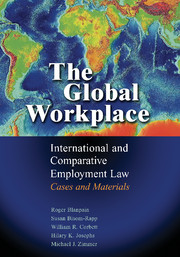Book contents
- Frontmatter
- Contents
- Acknowledgments
- Table of Cases
- Table of Statutes
- Table of Secondary Authorities
- 1 The Study of International and Comparative Employment Law
- 2 The International Labour Organization and International Labor Standards
- 3 The United States
- 4 Canada
- 5 Mexico
- 6 The Regulatory Approach of the North American Free Trade Agreement
- 7 The European Union
- 8 The United Kingdom
- 9 Germany
- 10 France
- 11 China
- 12 Japan
- 13 India
- 14 Pursuing International Labor Standards in U.S. Courts and Through Global Codes of Conduct
- Index
2 - The International Labour Organization and International Labor Standards
Published online by Cambridge University Press: 05 June 2012
- Frontmatter
- Contents
- Acknowledgments
- Table of Cases
- Table of Statutes
- Table of Secondary Authorities
- 1 The Study of International and Comparative Employment Law
- 2 The International Labour Organization and International Labor Standards
- 3 The United States
- 4 Canada
- 5 Mexico
- 6 The Regulatory Approach of the North American Free Trade Agreement
- 7 The European Union
- 8 The United Kingdom
- 9 Germany
- 10 France
- 11 China
- 12 Japan
- 13 India
- 14 Pursuing International Labor Standards in U.S. Courts and Through Global Codes of Conduct
- Index
Summary
INTRODUCTION
That inferior labor conditions in one country can supply it with a trade advantage over its competitors is not an idea of recent vintage. Likewise, pleas for universal labor standards on humanitarian and economic grounds were first made over 150 years ago. Edward E. Potter, The International Labor Organization, in International Labor and Employment Laws 40-1 (2d ed., William L. Keller & Timothy J. Darby, eds., 2003) (hereinafter Potter, The ILO). Despite some insipient efforts, however, scant progress was made toward establishing global labor standards until 1919. In that year, in the aftermath of World War I, the International Labour Organization (ILO) was established by the Treaty of Versailles as an autonomous body within the ill-fated League of Nations. Bob Hepple, Labour Laws and Global Trade 29-30 (2005) (hereinafter Hepple, Labour Laws). The ILO survived the disintegration of League, becoming in 1946 a specialized, tripartite agency of the United Nations, with member nations sending delegations comprised of representatives from government, organized labor and employers. As of October 2006, it had 179 member countries.
Animating the formation of the new organization in 1919 were the goals of promoting fair trade and ensuring worker protection from exploitation. The ILO was also founded on the principle that advancing social justice is a key element to establishing lasting peace. To those ends, the ILO's role is to promulgate international standards for implementation by its member nations, mainly by adopting, as will be described later, conventions and recommendations.
- Type
- Chapter
- Information
- The Global WorkplaceInternational and Comparative Employment Law - Cases and Materials, pp. 53 - 91Publisher: Cambridge University PressPrint publication year: 2007



